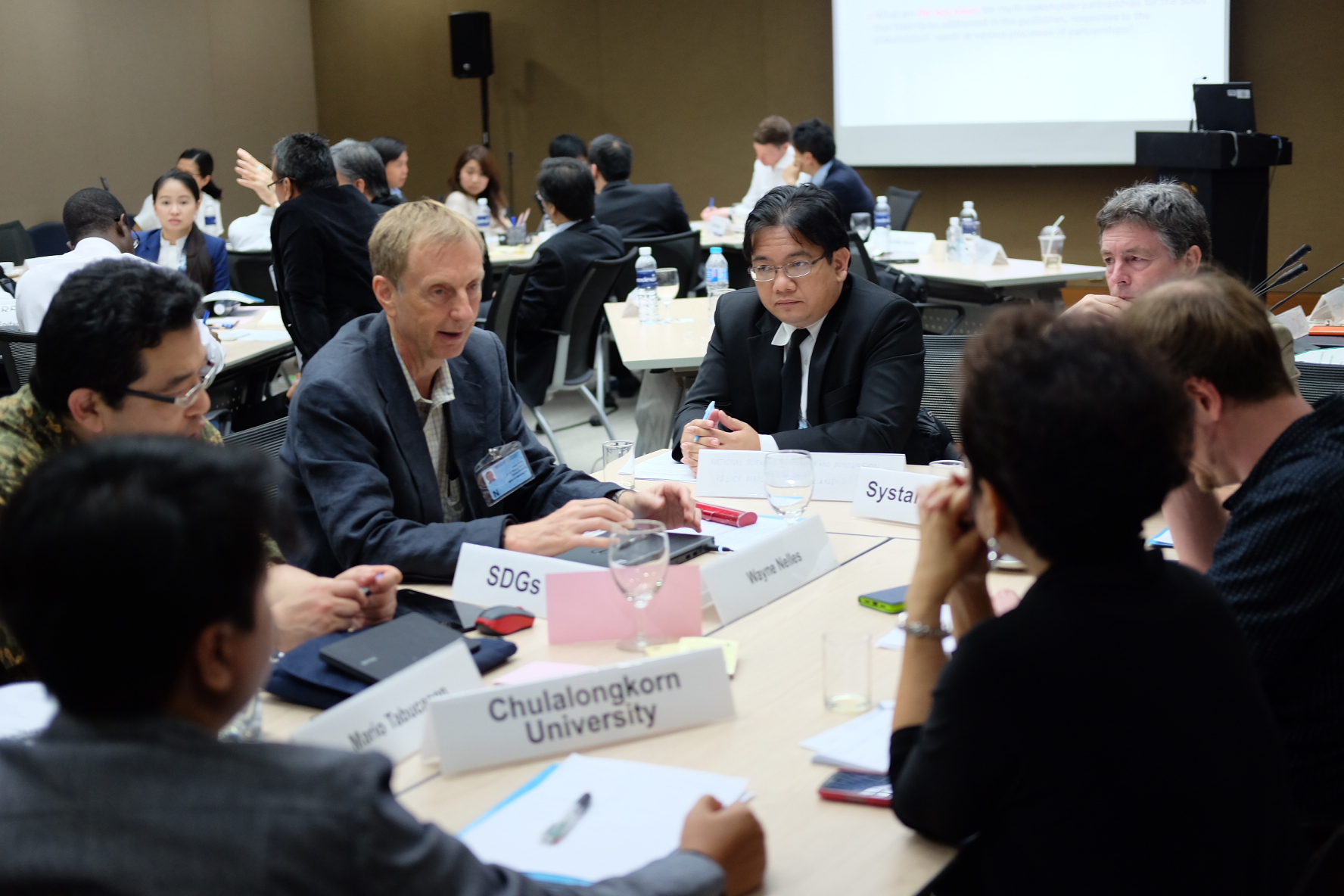2017-07-13

2017年3月28日、UNU-IASは国連アジア太平洋経済社会委員会 (UNESCAP) と共催で、「持続可能な開発に関するアジア太平洋フォーラム (APFSD) 2017」のサイドイベントしてワークショップ「アジア太平洋におけるSDGs実施のためのマルチステークホルダー・パートナーシップ」を在バンコク国連会議場で行いました。本ワークショップでは i) アジア太平洋地域の中小企業を対象とした多様な主体によるパートナーシップの特徴を把握、ii) これらの国々がどのようにしてパートナーシップを十分に活用、関連知識を共有するかに主眼をおき議論がなされました。また既に認識されている課題の検討、多様な主体間のパートナーシップによる持続可能な開発 (SDGs) の実施、フォローアップ及びレビューを地域、国家、国際レベルで保証していく方法を探る機会が提供されました。
本ワークショップではアジア太平洋地域の政府代表者、学者、市民社会、ビジネスセクター及び国際機関といった幅広いステークホルダーを介し、それぞれの立場からの経験と最も望ましい実践方法を紹介、議論しました。モナシュ大学のDavid John Griggs教授は基調講演で持続可能な目標間にある相互関連性を意識する事が重要であると強調し、それを基に当日の議論が進められました。実際のところ各々の機関は独立して個々の課題にのみ取り組み統合的な解決策は考慮しない傾向にあるため、同教授は各目標の間にある相互関連性を意識して、多様な主体がパートナーシップを形成するための効果的な在り方へ繋げていく事が重要であると述べました。
本イベントは、UNU-IASが実施する「SDGダイアログ」シリーズの一環として行われました。より詳しい内容については、英語版をご覧ください。
2017-07-13

On 28 March 2017, UNU-IAS and the United Nations Economic and Social Commission for Asia and the Pacific (UNESCAP) co-organized a workshop on Multi-stakeholder Partnerships for the SDGs Implementation in Asia and the Pacific at United Nations Conference Centre as a side event of the Asia-Pacific Forum on Sustainable Development (APFSD) 2017. The workshop aimed to: i) explore and identify the characteristics of a successful multi-stakeholder partnerships for small and medium-sized countries in Asia and the Pacific and; ii) to discuss how countries can take full advantage of such partnerships and share related knowledge. The workshop also provided an opportunity to explore known challenges and identify solutions to ensure that multi-stakeholder partnerships contribute toward the implementation, follow-up, and review of the Sustainable Development Goals (SDGs) at the local, national, and regional levels.
The workshop brought together a wide range of stakeholders from government representatives in the Asia and the Pacific region to academia, civil society, business and international organizations. Participants presented and discussed respective experiences and best practices. Professor David John Griggs (Monash University) emphasized the significance of addressing the interlinkages among SDG goals in his keynote presentation, and this formed the foundation of the day’s discussions. In practice, institutions tend to address individual development issues independently and not consider integrated solutions. Griggs appealed for translating the importance of addressing interlinkages into effective guidance to form multi-stakeholder partnerships.
In the last session, Mahesti Okitasari (Research Associate, UNU-IAS) introduced the concept of guidelines for SDGs partnerships in the Asia-Pacific region to be developed by UNU-IAS in collaboration with UNESCAP. The objective of the guidelines is to guide stakeholders involved in the development process on how they can build, align, and sustain their multi-stakeholder partnerships in support of the attainment of the SDGs. Participants in breakout groups discussed expectations as well as key issues to be addressed in the proposed guidelines.
The ongoing processes in the region are highly dynamic, involving new actors as an active part of national development decision-making processes. While some countries have stakeholder partnership platforms inherited from the Millennium Development Goals (MDGs), others have been trying to establish new frameworks to include a wider range of players. Though some challenges the countries face are common in nature, there is no one-for-all solution. Thus, context-specific strategies are essential to establish sound multi-stakeholder partnerships. Second, the institutional capacity of government agencies is often not sufficient to strenuously push forward the SDG implementation process or partnership building. In particular, limited capacity to work outside silos, to collect and analyze big data, for policy planning (especially at the local level), and to ensure necessary financial resources are frequent impediments to SDG implementation. In this regard, the involvement of the international community, including the UN system and donor agencies, is seen as essential.
Kazuhiko Takemoto (Director, UNU-IAS) concluded the workshop by expressing appreciation for the active contribution of participants as itself an example of a successful multi-stakeholder partnership.
The programme, list of participants, and presentation materials from the event can be found HERE. (linked to website of UNU-IAS)